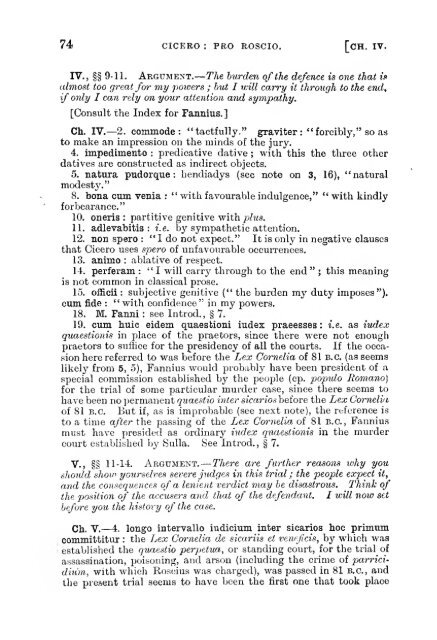Pro S. Roscio Amerino
Pro S. Roscio Amerino
Pro S. Roscio Amerino
You also want an ePaper? Increase the reach of your titles
YUMPU automatically turns print PDFs into web optimized ePapers that Google loves.
74 CICERO : PRO ROSCIO. [cH. IV.<br />
IV., §§ 9-11. Argument.—The burden ofthe defence is one that is<br />
almost too greatfor my powers ; but I will carry it through to the end,<br />
if only I can rely on your attention and sympaihy.<br />
[Consult the Index for Fannius.]<br />
Ch. IV.—2. commode : "tactfuUy." graviter : "foreibly," so as<br />
to make an impression oii the minds of the jury.<br />
4. impedimento : predicative dative ; with this the three other<br />
datives are eonstructed as indirect objects.<br />
5. natura<br />
modesty."<br />
pudorque : hendiadys (see note on 3, 16), "natural<br />
8. bona cum venia " : with favourable indulgence," " with kindly<br />
forbearance."<br />
10. oneris : partitive genitive with phis.<br />
11. adlevabitis : i.e. by sympathetic attention.<br />
12. non spero : "I do not expect." It is only in negative clauscs<br />
that Cicero uses spero of unfavourable occurrences.<br />
13. animo : ablative of respect.<br />
14. perferam : "I will carry through to the end " ; this meaning<br />
is not coramon in classical prose.<br />
15. officii : subjective genitive (" the burden my duty imposes").<br />
cum fide : " with confidence " in my powers.<br />
18. M. Fanni : see Introd., § 7.<br />
19. cum huic eidem quaesbioni iudex praeesses : i.e. as ivdex<br />
quaestionis in j)lace of the praetors, since there were not enough<br />
praetors to suliiee for the presidency of all the courts. If the occasion<br />
herereferred to was before the Lex Comdia of 81 B.c. (as seems<br />
likely from 5, 5), Fannius would probably have been president of a<br />
special coramission established by the people (cp. popxdo Romano)<br />
for the trial of some particular murder case, since there seems to<br />
have been no permanent quaestio inter sicarios before the Lex Comelid<br />
of 81 B.C. But if, as is improbable (see next note), the reference is<br />
to a tirae afler the passing of the Lex Cornelia of 81 B.C., Fannius<br />
raust have presided as ordinary iudex quaestionis in the murder<br />
court established by SuUa. See Introd., § 7.<br />
V., §§ 11-14. Argument.— TAere are further reasons luhy you<br />
shoidd show yourselves severe jiidges in this trial ; the people expect it,<br />
and the consequences ofa lenient verdict may be disastrous. Think of<br />
the position of the accusers and that of the defendant. I will now set<br />
hefcn-e you the history of the case.<br />
1 Ch. V.—4. longo intervallo iudicium inter sicarios hoc primum<br />
committitur : the Lex Cornelia de sicariis et vewfcis, by which was<br />
I<br />
I<br />
established the quaestio perpetua, or standing court, for the trial of<br />
\ assassination, poisoning, aiid arson (including the crime of parrici-<br />
\ dium, with which Roscius was cliarged), was passed in 81 b.c, and<br />
t tlie prcsent trial seems to have bcen the first one that took placo

















